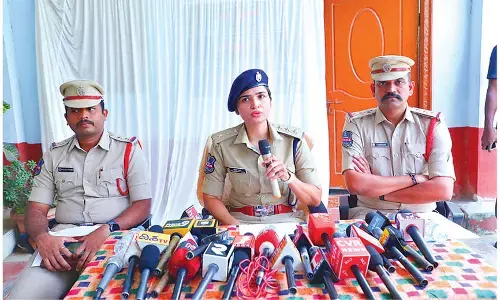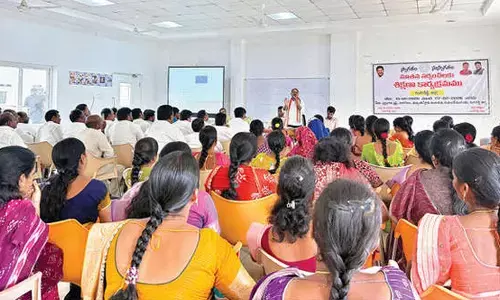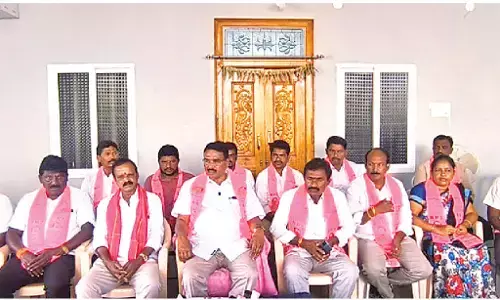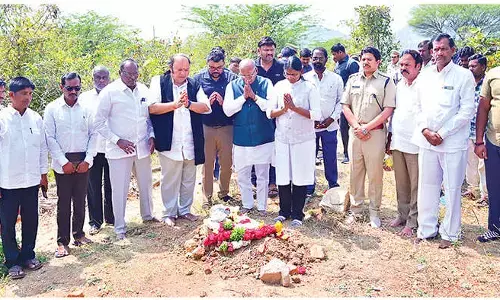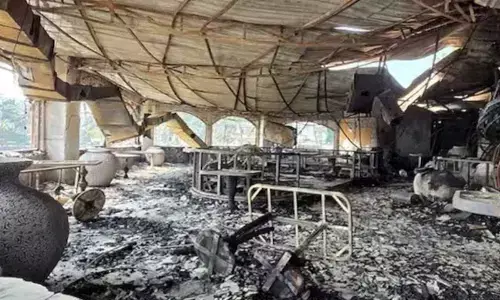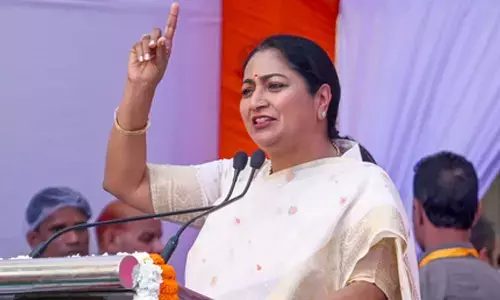No political will for women’s quota
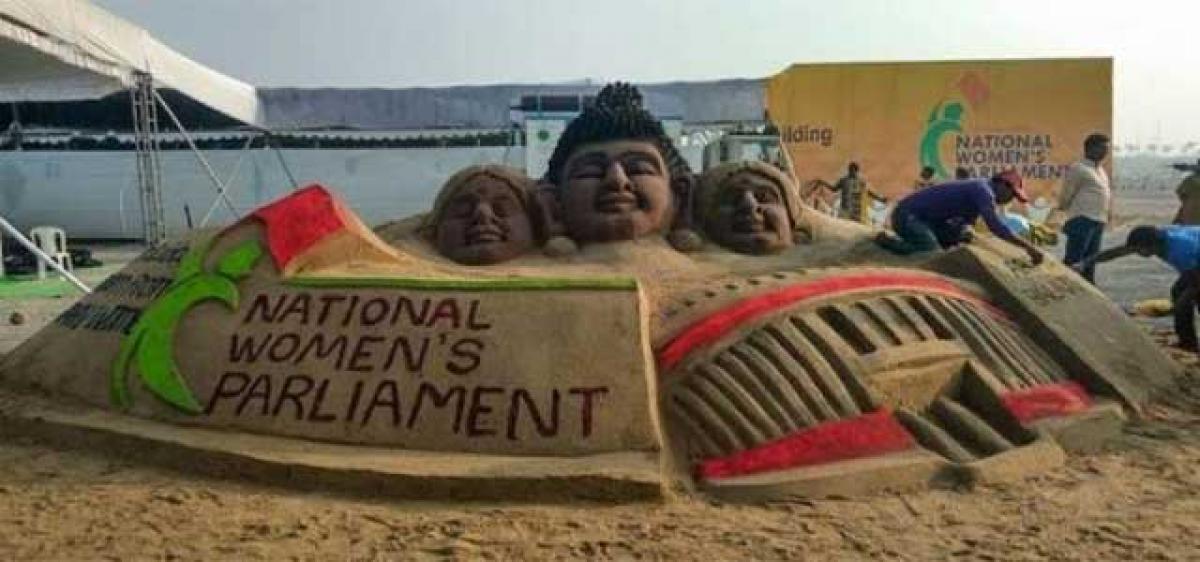
Addressing the National Women\'s Parliament at Amaravati, she called upon all political parties to shed animosities and back the bill for providing reservation to women in legislative bodies. She is right in her contention that agitating for reservations is not a fight against men, but only a democratic exercise that seeks basic human, civil and political rights.
It is rather surprising that in the country’s parliamentary history, the women’s reservation bill is the only bill that failed to become an Act despite a clear parliamentary majority for it. The flimsy reasons given by successive governments reveal a lack of political will to push it through
The forum was just about perfect and Lok Sabha Speaker Sumitra Mahajan took advantage of the occasion to the fullest.
Addressing the National Women's Parliament at Amaravati, she called upon all political parties to shed animosities and back the bill for providing reservation to women in legislative bodies. She is right in her contention that agitating for reservations is not a fight against men, but only a democratic exercise that seeks basic human, civil and political rights.
It is rather surprising that in the country’s parliamentary history, the women’s reservation bill is the only bill that failed to become an Act despite a clear parliamentary majority for it. The flimsy reasons given by successive governments reveal a lack of political will to push it through.
Even more bizarre is the pretext that is trumpeted by who has you – lack of political consensus. Nowhere is it written in the Constitution or in the law that a bill can be enacted only if there is a political consensus. In fact, many Acts were made despite the strongest opposition to them in Parliament.
The patriarchal political value system is the only hindrance in achieving political empowerment of women. One is yet to arrive at conclusive answers as to why Parliament and state legislatures cannot boast of more women members.
Critical for democracy
Democracy is the most representative form of political organisations that human civilisation has known so far. Democracy is rendered meaningless when women who constitute nearly half of the population, have only 12 per cent representation in India. Women political empowerment really means active participation in decision-making process in a participatory parliamentary democracy.
As Inter-Parliamentary Union observed, “The concept of democracy will only assume true and dynamic significance when political parties and national legislatures are decided upon jointly by men and women in equitable regard for the interests and aptitudes of both halves of the population.”
Political participation of all sections of society is essential for building a functioning and representative democracy.
It grants political sovereignty to the people: the people must therefore retain a fundamental belief in its ability to represent their needs and act for their overall betterment. In terms of countering apathy, reservation for a sub-group of the population can open up the system and demonstrate that a democratically elected government works for them, and that is not just an elite bureaucracy functioning solely for the dominant sections of society (Centre for Legislative Research and Advocacy).
The Constitution of India is a progressive document that guarantees equal rights for both sexes, and entitles women to enjoy economic, social, cultural and political rights on an equal footing with men (Article 325).
It proceeds to consider the appropriate use of legislation to redress inequality and prevent further infringement of women's fundamental democratic freedoms and human rights. Under Article 15 (3), the State is thereby empowered to make “special provisions,” legislative or otherwise, to secure women's socio-political advancement.
India ranks very low in Human Development Index. Women suffer more than men due to lack of education, health, hygiene, sanitation, drinking water and nutrition, among other things. Women are generally more concerned about these issues. Greater representation for women shall ensure a shift in the focus of development agenda towards human development and social development.
Didi, Bibi, Beti Syndrome?
It is said that quota for women will help those belonging to influential political families. It is true that influential people would utilise these reservations at the beginning. However, in due course political leadership will emerge as evident from Scheduled Caste and Scheduled Tribe reservations. At the initial stage, landlords fielded their henchmen and enjoyed power by proxy. But things changed substantially over a period of time.
If we look closely at Indian politics, we would notice two discernible trends. First, women who have entered politics might have used their family background at the beginning. But during the course of their political career they emerged as political leaders on their own.
Indira Gandhi stands as a classic example of this category. On the other hand, there have been women political leaders who have grown in their political career without any influential family background like Mamta Banerjee and Mayawati.
It is wrong to oppose women’s reservations on the ground that it will lead to didi, bibi, beti syndrome (sister, wife or daughters of influential political leaders getting benefited by these reservations).
Quota within Quota?
Some political parties are opposing the bill on the ground that it would benefit upper caste women. As a result, the composition of BCs and minorities would be adversely affected. Such a possibility cannot be ruled out. The emerging electoral trends further strengthen these apprehensions. In 1989, the proportion of OBCs in the Lower House jumped from 11 per cent to 21 per cent, and continued to rise in the post-Mandal phase until 2004, when it peaked at 26 per cent.
In 2009 the share of OBCs declined to 18 per cent.OBC representation remained at around 20 per cent in 2014 too. OBCS are now back to their pre-Mandal level of representation. With less than four per cent, the representation of Muslims is at a historical low.
OBCs and Muslim women are not represented within the Women's Reservation Bill simply because there is no general reservation for OBCs and Muslims, and as such a sub-quota within the Women's Reservation Bill may be unconstitutional.
Therefore, the first demand should be for a Constitutional amendment that enables a general OBC quota. No law is final. Every law evolved over a period of time. Women, as a social category, suffer discrimination cutting across caste, class, religion in our society.
We can begin with women’s reservation and in case the experience reveals that upper caste women are getting disproportionately higher share, the law can be suitably amended.
Faulty Alternatives
Given these objections, several alternative measures are being suggested. The most important among them is to amend the Proportional Representation Act in order to mandate every political party to field women in at least one-third of the constituencies.
This seems to be an intelligent all-encompassing solution. But a closer scrutiny of the proposal reveals its true character. If this proposal is implemented as an alternative, political parties, driven by patriarchal values, are bound to field women in constituencies where their wining prospects are either bleak or nearer to zero.
Meanwhile, an amendment is suggested to prevent such a misuse. According to this amendment, every political party has to field women in at least one-third of Parliamentary seats in every State. Furthermore, such a proportional representation in mandated in every district during Assembly elections.
But, this amendment is not a complete solution to the possibility of misuse. Every political party can easily identify weaker seats and field women in them. It is, in fact, difficult to implement such a proposal in the era of coalitions, as all political parties do not contest all the seats.
Yet another alternative being suggested is that there shall be dual membership in one-third of seats. Apart from a general member, there ought to be a woman member. However, this is not political empowerment of women as their status will be titular in nature. The real power would be wielded by the general member only.
There may not be any arithmetical sanctity for the demand, but reserving one-third of seats would mean a substantial increase from the present level of representation and shall be relatively nearer to the population of women. Any attempt to dilute this proportion is absolutely undemocratic.
The other proposals are also equally undemocratic. For instance, yet another proposal is to keep the present strength untouched and create one third additional seats and reserve them for women. But anyone who knows arithmetic would understand that this would not be one-third but much less.
In fact, all such alternatives are a result of lack of political will and a fraudulent political apparatus. The often-quoted argument for not fielding sufficient number of women candidates is the winnability factor.
This argument lacks conviction given the fact that women have a meager presence in the Upper Houses too. The low level of women’s representation in the Rajya Sabha provides an ample reflection of an abysmal lack of commitment of our political system to achieve the goal of political empowerment of women.
Therefore, the only alternative is to implement the commitment to enact women’s reservation bill. The act can be amended based on experiences gained.


